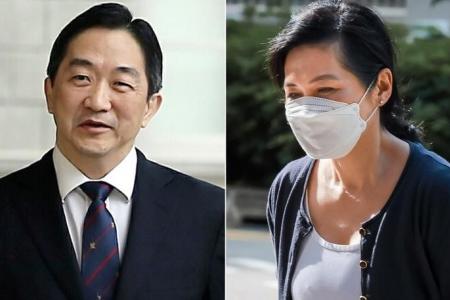Penny stock crash mastermind John Soh jailed 36 years, ex-girlfriend Quah Su-Ling gets 20 years
John Soh Chee Wen, the mastermind of Singapore’s biggest case of stock market manipulation that wiped out nearly $8 billion in market value in October 2013, was sentenced to 36 years in jail, while his co-conspirator Quah Su-Ling was handed 20 years.
Both are appealing their sentences. Quah was granted $4 million bail pending her appeal.
The sentencing brought to a close a court case that spanned 349 successful charges in some 200 days of trial over nearly four years.
Prosecutors sought a jail sentence of 40 years for Soh, and 19½ years’ for his co-mastermind Quah, because Soh is “more culpable as this remains his scheme... his purpose”, Deputy Public Prosecutor Nicholas Tan said in a November hearing.
The pair were convicted on all 10 market manipulation charges brought against them under Section 197 of the Securities and Futures Act.
They were found to have manipulated the share prices of Blumont Group, Asiasons Capital and LionGold Corp – known collectively as BAL – between August 2012 and October 2013, through 187 trading accounts held with 20 financial institutions in the names of 58 individuals and companies.
Soh, 63, has been in remand since November 2016, while Quah, 58, the former chief executive of Ipco (now renamed Renaissance United), is out on bail of $4 million.
Of the 180 charges on which Soh was convicted, prosecutors sought consecutive sentences for 11 charges (three of false trading, three deception charges, two cheating charges and three tampering charges) and an aggregate sentence of 40 years’ jail.
For Quah, who was convicted on 169 charges, the prosecution sought consecutive sentences for six charges (two false trading charges, three deception charges and one cheating charge), and an aggregate sentence of 19½ years’ jail. The prosecution did not propose any discount for Quah, “given the shorter aggregate sentence”.
When investigations began after the penny stock crash, Soh began “subverting the administration of justice”.
“Over nearly 2½ years, he coordinated and shaped the evidence that he demanded key witnesses falsely provide to the authorities, using promises and threats,” the prosecution said in November.
DPP Tan also likened the near $8 billion loss in market capitalisation resulting from the penny stock crash to “the equivalent of wiping out the market capitalisation of 33 Pan-Electric Industries (Pan-El)”.
The collapse of Pan-El in 1985, which had a market cap of $230 million, resulted in the closure of the Singapore and Malaysian stock exchanges for three days in order to contain the fallout on heavily leveraged stockbroking firms.
But Soh’s defence lawyer, Senior Counsel N. Sreenivasan, had argued that in the aftermath of the penny stock crash, “the market was not closed... and no financial institution went down”.
He said that Soh and Quah were not the only persons involved in the scheme.
Mr Sreenivasan said that for the purposes of sentencing, a significant part of the BAL trade volume carried out by prosecution witnesses Leroy Lau, Ken Tai, Henry Tjoa and Gabriel Gan should not be attributed to Soh and Quah.
“Their sentences cannot be such that they are the scapegoats for the wrongs of others,” he said.
In asking for a sentence of between seven and 13 years for Soh, Mr Sreenivasan had said: “In the final analysis, the present case is no Pan-El or Barings/Nick Leeson, and the sentence cannot be anything close to the 40 years that is being sought.”
Get The New Paper on your phone with the free TNP app. Download from the Apple App Store or Google Play Store now


